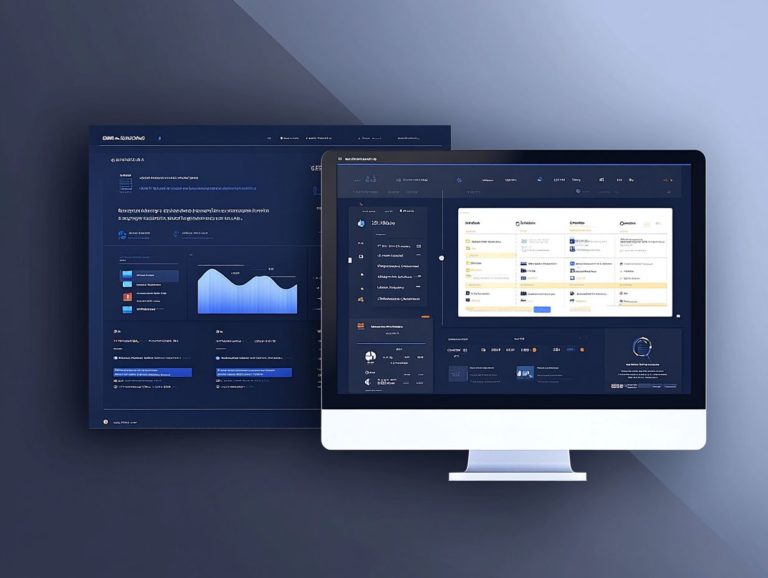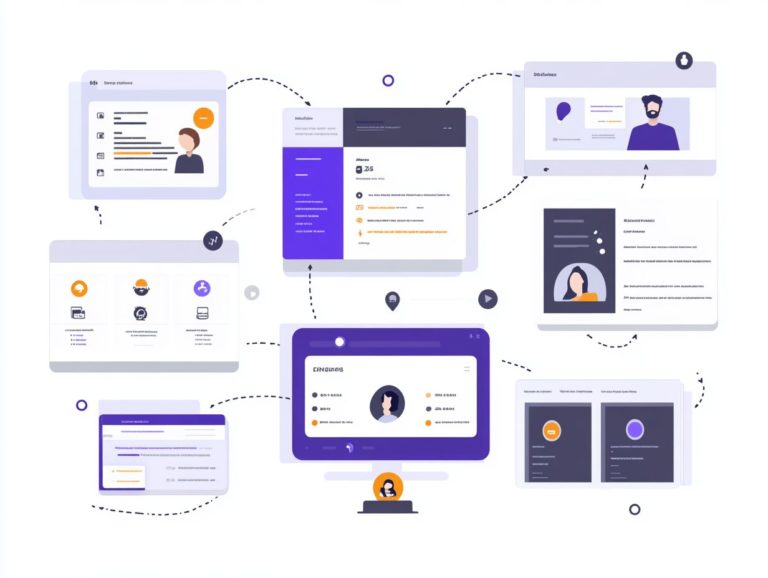Choosing the Right CRM for Your Startup
In today s fast-paced business landscape, having a robust Customer Relationship Management (CRM) system is essential for startups aspiring to thrive. A well-chosen CRM system streamlines your interactions with customers and significantly enhances your overall business strategy.
This article delves into the critical factors you should consider when selecting the ideal CRM for your needs. We ll cover assessing your goals, evaluating scalability and costs, exploring various types of CRM software, highlighting top options specifically tailored for startups, and sharing best practices for effective implementation.
Jump in and see how the right CRM can supercharge your startup’s success now!
Contents
- Key Takeaways:
- Factors to Consider when Choosing a CRM
- Types of CRM Software
- Top CRM Options for Startups
- Implementing and Utilizing Your Chosen CRM
- Frequently Asked Questions
- 1. Wondering what CRM is and why it matters for your startup?
- 2. How do I decide which is the right CRM for my startup?
- 3. Is a cloud-based or on-premise CRM better for my startup?
- 4. Can I switch to a different CRM if I’m not satisfied with my current one?
- 5. Are all CRMs suitable for startups?
- 6. What are some key features to look for in a CRM for my startup?
Key Takeaways:

Choose a CRM that aligns with your business needs and goals for scalability and cost efficiency.
Consider the user-friendliness and integration capabilities of a CRM to ensure smooth implementation and utilization.
Explore different types of CRM software, such as cloud-based and industry-specific options, to find the best fit for your startup by learning how to choose CRM software for small business.
What is CRM and Why is it Important for Startups?
Customer Relationship Management (CRM) is an essential asset for startups, acting as a central hub for customer information and automating tasks within your business to enhance your sales cycle. This ultimately leads to improved customer satisfaction and loyalty.
By using CRM systems, you can effortlessly track customer interactions, analyze data, and streamline your sales processes. This enables you to effectively address customer pain points and create growth opportunities in a competitive market.
With the right CRM in place, you can transform your customer journey into a more engaging and personalized experience, significantly boosting your chances of success during those critical early stages.
The value of CRM goes beyond mere data storage; it offers invaluable insights that enable you to make informed decisions, helping you identify trends and anticipate customer needs.
Sales automation features dramatically reduce manual tasks, freeing your team to focus on building relationships instead of getting bogged down in administrative duties. By centralizing customer data, these tools promote enhanced collaboration among your teams, ensuring that every stakeholder is aligned and responsive to customer inquiries.
Ultimately, effective CRM usage cultivates long-term loyalty, making it an essential partner in driving growth and operational efficiency for emerging businesses like yours.
Factors to Consider when Choosing a CRM
When choosing a CRM for your startup, it’s crucial to weigh several factors that will profoundly impact your sales process and customer relationship management.
Consider the tools at your disposal, the capability for automating workflows, and the quality of customer support provided. A carefully selected CRM will not only streamline your internal processes but also enhance collaboration among stakeholders and offer valuable insights into customer interactions.
Understanding how the CRM integrates with your existing software is crucial. Evaluating the strength of its community support can significantly elevate your overall adoption and effective use of the tool.
Business Needs and Goals
Understanding your business needs and goals is paramount when choosing the right CRM; it directly impacts how effectively it can support your sales cycle and elevate customer satisfaction.
Each startup has distinct objectives, whether it’s lead tracking or pipeline management, and aligning these with a CRM’s capabilities can significantly enhance operational efficiency and enable personalized outreach. For insights on this, comparing CRM scalability can help you determine which system is right for you.
To assess your needs effectively, start by defining clear sales goals that align with your business vision. Begin by pinpointing customer pain points through surveys or direct feedback, which will provide invaluable insights into their challenges and expectations.
This information enables you to customize CRM functionalities that not only tackle these pain points but also align with your strategic objectives.
For instance, solutions like Salesforce are excellent for managing sales pipelines, while HubSpot shines when it comes to user-friendly lead tracking.
By pairing the right tools with your specific needs, you can optimize operations and cultivate stronger customer relationships.
Scalability and Cost
Evaluar la escalabilidad y el costo de un CRM es esencial para usted como startup. Elegir una soluci n que pueda crecer junto con su negocio es clave.
Esto garantiza eficiencia a largo plazo y minimiza la necesidad de futuras migraciones. Priorice plataformas de nivel inicial que ofrezcan opciones de automatizaci n y personalizaci n.
Esto permite a su equipo adaptarse sin incurrir en gastos financieros excesivos. Esta decisi n impacta tanto sus operaciones diarias como sus relaciones con los clientes.
Al evaluar varias soluciones de CRM, compare diferentes modelos de precios. Est atento a posibles costos ocultos, como tarifas adicionales por usuario o gastos de integraci n.
Algunas plataformas ofrecen herramientas de an lisis mejoradas y soporte al cliente dedicado. Estos beneficios pueden aumentar significativamente su productividad general.
Al sopesar cuidadosamente estos factores, podr seleccionar un CRM que fomente el crecimiento y garantice el mejor retorno de inversi n.
User-Friendliness and Integration

The user-friendliness of a CRM system is crucial for your team s adoption. It also impacts integration with existing software for better automation and collaboration.
A straightforward interface boosts productivity. It lets you focus on building customer relationships instead of wrestling with complicated workflows.
When team members feel overwhelmed, CRM adoption drops. This stifles collaboration and communication.
Choose tools like HubSpot CRM or Salesforce for their intuitive design. This creates an environment that promotes efficiency.
Platforms like HubSpot CRM and Salesforce offer strong integrations with email marketing, project management, and finance tools. This enhances synergy across departments.
As a result, you and your colleagues can easily transition between tasks. This ultimately improves workflow and increases customer satisfaction.
Types of CRM Software
Grasping the various types of CRM software is vital for startups. Each type—cloud-based, on-premise, and industry-specific—has unique features tailored to different business needs, and knowing how to get started with CRM software can further enhance your understanding.
Cloud-based CRMs like Salesforce and HubSpot offer flexibility and scalability through subscription models. On-premise solutions, on the other hand, provide heightened security and customization.
Understanding these options helps you make informed decisions that align with your business objectives.
Cloud-based vs On-premise
The choice between cloud-based and on-premise CRM solutions revolves around accessibility, cost, and security. Evaluate your operational needs before making a decision.
Cloud platforms like Salesforce and HubSpot offer quick deployment and device accessibility. On-premise systems provide enhanced data security for businesses with strict compliance needs.
Cloud-based CRMs offer regular updates and seamless integrations with online tools. This ensures they remain adaptable to the evolving business landscape.
On-premise options like Microsoft Dynamics involve higher upfront costs. However, they allow for deeper customization tailored to your industry.
Scalability is also a consideration. Cloud solutions accommodate growth through flexible subscription models, while on-premise setups often require additional investments.
By understanding these nuances, you can choose a CRM that best aligns with your future goals.
Industry-Specific CRMs
Industry-specific CRMs are tailored solutions meeting the unique needs of different sectors. They enhance customer interactions and optimize sales processes by addressing specific workflows and customer engagement strategies.
For example, real estate CRMs offer features like listing integrations and automated follow-ups. Meanwhile, healthcare CRMs focus on managing patients and complying with data regulations.
Noteworthy options include:
- Salesforce for Healthcare, ensuring compliance with HIPAA regulations.
- HubSpot s real estate solutions that simplify lead tracking.
In retail, CRMs like Lightspeed improve operations with robust inventory management and customer loyalty integration. This significantly enhances the shopping experience.
Choosing a CRM designed for your sector can boost both efficiency and customer satisfaction.
Top CRM Options for Startups
Choosing the right CRM can greatly impact your startup’s success. Explore implementing CRM in a startup environment to improve processes and customer relationships.
Platforms like Salesforce, HubSpot, and Pipedrive offer features tailored for growing businesses. They provide tools for lead tracking, automation, and analytics.
Features and Benefits

The features of a CRM system are key to improving business efficiency and driving sales. With automation, reporting, and analytics, you can streamline interactions and optimize workflows.
Automation can save time on routine tasks, allowing your team to build meaningful relationships. Reporting provides a comprehensive overview of performance, highlighting trends you can act on.
Advanced analytics help you understand customer behavior, enabling personalized outreach. When you leverage these features well, you respond better to clients and make data-driven decisions for growth.
Pricing and Customer Reviews
Pricing for CRM software varies widely. Carefully evaluate your options and consider customer reviews in your assessment.
Feedback from users reveals insights into software performance and usability. It’s crucial to understand how well a CRM meets specific needs.
Explore different subscription models, including monthly or annual plans. Be aware of hidden costs, such as fees for extra features and licenses that can increase your expenses.
Customer feedback provides clear insights into a CRM’s strengths and weaknesses. Use this information to make informed decisions that align with your business goals.
Implementing and Utilizing Your Chosen CRM
Implementing your CRM requires careful planning and a commitment to best practices. Integrate it seamlessly into your existing workflows for optimal results.
By following a structured approach, you can unlock your CRM s full potential and elevate customer interactions.
Best Practices for Successful Implementation
Adhering to best practices for successful CRM implementation is essential for fostering user engagement and ensuring seamless integration with your existing systems.
Key recommendations include:
- Defining clear objectives
- Providing comprehensive training
- Maintaining open lines of communication among stakeholders to address any concerns and feedback during the transition
To further enhance the effectiveness of your CRM system, consider involving users in the selection process. Their insights will help shape the configuration of the tool to better meet your team’s needs.
Implementing automation features, like lead scoring and follow-up reminders, can significantly improve efficiency and user satisfaction. Just ask the companies that have reported a noticeable boost in productivity.
Hold regular training sessions at launch and ongoing to equip your users with the necessary skills to fully utilize the system. Additionally, maintaining accessible support channels fosters a culture of continuous improvement and encourages valuable feedback, which is crucial for adapting the system to meet your evolving business needs.
Maximizing the Benefits of Your CRM
Maximizing the benefits of your CRM requires continuous evaluation of its features and an adaptive approach to enhance customer interactions while gathering valuable insights.
By regularly seeking feedback from users and analyzing performance metrics, you can identify opportunities for improvement, ensuring that your CRM evolves alongside your growing needs.
Incorporating regular training sessions for your team can significantly boost user proficiency, leading to more effective utilization of the system. This proactive strategy not only enhances user confidence but also cultivates a culture of adaptability, enabling employees to share their insights freely.
Consistently analyzing customer feedback allows you to tailor workflows, ensuring that your processes align closely with user expectations and market demands.
By prioritizing these strategies and integrating newfound insights, you can effectively leverage your CRM to nurture customer relationships and promote lasting success.
Frequently Asked Questions

1. Wondering what CRM is and why it matters for your startup?
A Customer Relationship Management (CRM) system is software that helps businesses manage their interactions and relationships with customers. It is important for startups because it enables them to track leads, manage customer data, and improve customer service, ultimately leading to business growth and success.
2. How do I decide which is the right CRM for my startup?
When choosing the right CRM for your startup, consider your budget, business needs, and growth plans. Research and compare different CRMs, read reviews, and explore the best CRM software options for startups to see which one best fits your specific requirements.
3. Is a cloud-based or on-premise CRM better for my startup?
Cloud-based CRMs are usually more cost-effective and offer easier implementation and scalability, making them a popular choice for startups. However, if you have strict data security and privacy requirements, an on-premise CRM may be a better fit. Consider your business needs and budget before making a decision.
4. Can I switch to a different CRM if I’m not satisfied with my current one?
Yes, you can switch to a different CRM if you’re not satisfied with your current one. However, it may be a time-consuming and costly process, so it’s important to thoroughly research and choose the right CRM for your startup from the beginning.
5. Are all CRMs suitable for startups?
No, not all CRMs are suitable for startups. Some CRMs are designed for large enterprises and may have features and pricing that are not suitable for startups. It’s important to choose the right CRM integrations specifically designed for small businesses and startups.
6. What are some key features to look for in a CRM for my startup?
Some key features to look for in a CRM for your startup include lead management (organizing potential customers), contact management (keeping track of customer details), sales forecasting (predicting future sales), and customer service tools. Additionally, choosing the right CRM workflow that integrates with other business tools and offers a user-friendly interface are also important factors to consider.






